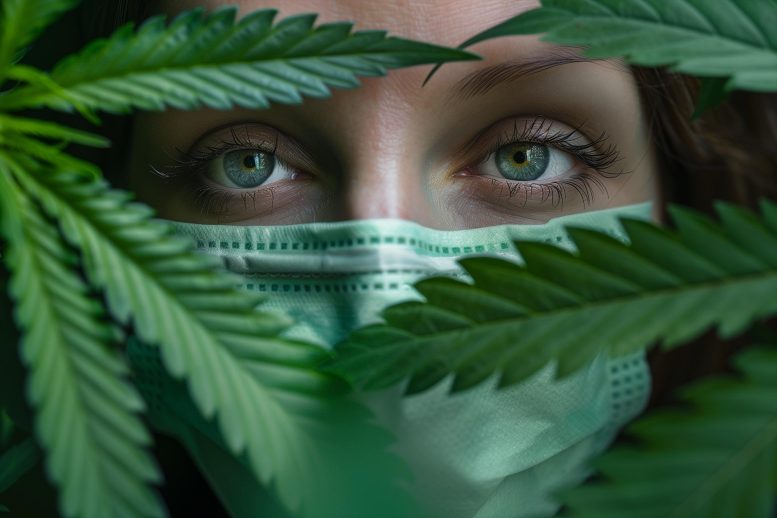
A study has highlighted the potential risks associated with cannabis use during COVID-19, showing an increased likelihood of hospitalization and intensive care compared to non-users.
Similar to smokers, cannabis users are nearly twice as likely to need hospitalization and intensive care when infected with the virus.
A new study indicates that cannabis users face higher risks of serious COVID-19 illness requiring hospitalization and ICU care, similar to tobacco users. However, their mortality rates do not increase. The findings highlight the need for more research on cannabis’s impact on health, especially in viral infections.
Cannabis Use Tied to Increased Risk of Severe COVID-19
As the deadly disease that came to be known as COVID-19 started spreading in late 2019, scientists rushed to answer a critical question: Who is most at risk?
They quickly recognized that a handful of characteristics — including age, smoking history, high body mass index (BMI), and the presence of other diseases such as diabetes — made people infected with the virus much more likely to become seriously ill and even die. But one suggested risk factor remains unconfirmed more than four years later: cannabis use. Evidence has emerged over time indicating both protective and harmful effects.
Link Between Cannabis Use and COVID-19 Severity
Now, a new study by researchers at Washington University School of Medicine in St. Louis points decisively to the latter: Cannabis is linked to an increased risk of serious illness for those with COVID-19.
The study, published on June 21 in the medical journal JAMA Network Open, analyzed the health records of 72,501 people seen for COVID-19 at health centers in a major Midwestern health-care system during the first two years of the pandemic. The researchers found that people who reported using any form of cannabis at least once in the year before developing COVID-19 were significantly more likely to need hospitalization and intensive care than were people with no such history. This elevated risk of severe illness was on par with that of smoking.

Nurse Megan Roberts cares for a COVID-19 patient in an intensive care unit at Barnes-Jewish Hospital in 2020. A study by researchers at Washington University School of Medicine in St. Louis shows that people with COVID-19 who used cannabis were more likely to be hospitalized and require intensive care than those who did not use the drug. Credit: Matt Miller/Washington University
“There’s this sense among the public that cannabis is safe to use, that it’s not as bad for your health as smoking or drinking, that it may even be good for you,” said senior author Li-Shiun Chen, MD, DSc, a professor of psychiatry. “I think that’s because there hasn’t been as much research on the health effects of cannabis as compared to tobacco or alcohol. What we found is that cannabis use is not harmless in the context of COVID-19. People who reported yes to current cannabis use, at any frequency, were more likely to require hospitalization and intensive care than those who did not use cannabis.”
Comparison of Cannabis and Tobacco Effects
Cannabis use was different than tobacco smoking in one key outcome measure: survival. While smokers were significantly more likely to die of COVID-19 than nonsmokers — a finding that fits with numerous other studies — the same was not true of cannabis users, the study showed.
“The independent effect of cannabis is similar to the independent effect of tobacco regarding the risk of hospitalization and intensive care,” Chen said. “For the risk of death, tobacco risk is clear but more evidence is needed for cannabis.”
Comprehensive Study and Data Analysis
The study analyzed deidentified electronic health records of people who were seen for COVID-19 at BJC HealthCare hospitals and clinics in Missouri and Illinois between Feb. 1, 2020, and Jan. 31, 2022. The records contained data on demographic characteristics such as sex, age, and race; other medical conditions such as diabetes and heart disease; use of substances including tobacco, alcohol, cannabis, and vaping; and outcomes of the illness — specifically, hospitalization, intensive-care unit (ICU) admittance and survival.
COVID-19 patients who reported that they had used cannabis in the previous year were 80% more likely to be hospitalized and 27% more likely to be admitted to the ICU than patients who had not used cannabis, after taking into account tobacco smoking, vaccination, other health conditions, date of diagnosis, and demographic factors. For comparison, tobacco smokers with COVID-19 were 72% more likely to be hospitalized and 22% more likely to require intensive care than were nonsmokers, after adjusting for other factors.
These results contradict some other research suggesting that cannabis may help the body fight off viral diseases such as COVID-19.
“Most of the evidence suggesting that cannabis is good for you comes from studies in cells or animals,” Chen said. “The advantage of our study is that it is in people and uses real-world healthcare data collected across multiple sites over an extended time period. All the outcomes were verified: hospitalization, ICU stay, and death. Using this data set, we were able to confirm the well-established effects of smoking, which suggests that the data are reliable.”
Potential Mechanisms and Future Research
The study was not designed to answer the question of why cannabis use might make COVID-19 worse. One possibility is that inhaling marijuana smoke injures delicate lung tissue and makes it more vulnerable to infection, in much the same way that tobacco smoke causes lung damage that puts people at risk of pneumonia, the researchers said. That isn’t to say that taking edibles would be safer than smoking joints. It is also possible that cannabis, which is known to suppress the immune system, undermines the body’s ability to fight off viral infections no matter how it is consumed, the researchers noted.
“We just don’t know whether edibles are safer,” said first author Nicholas Griffith, MD, a medical resident at Washington University. Griffith was a medical student at Washington University when he led the study. “People were asked a yes-or-no question: ‘Have you used cannabis in the past year?’ That gave us enough information to establish that if you use cannabis, your health-care journey will be different, but we can’t know how much cannabis you have to use, or whether it makes a difference whether you smoke it or eat edibles. Those are questions we’d really like the answers to. I hope this study opens the door to more research on the health effects of cannabis.”
Reference: “Cannabis, Tobacco Use, and COVID-19 Outcomes” by Nicholas B. Griffith, Timothy B. Baker, Brendan T. Heiden, Nina Smock, Giang Pham, Jingling Chen, Justin Yu, James Reddy, Albert M. Lai, Eric Hogue, Laura J. Bierut and Li-Shiun Chen, 21 June 2024, JAMA Network Open.
DOI: 10.1001/jamanetworkopen.2024.17977









Just say NO!
Drugs are a crutch for the weak-minded.
Drugs are used to keep you disconnected from the events happening around you.
They inhibit your ability, or desire, to make decisions and make you more compliant.
They also demotivate you to do productive things.
I didnt realize just how bad cannabis was affecting my life until I quit smoking it.
But the government, and those in power, are learning Cannabis is a valuable tool in societal control.
There is a reason they are “decriminalizing” it and making it legal everywhere.
The government does nothing for the people unless it benefits those in power in some way.
Dont be a sucker and fall for the trap.
Governments like anything they can gain tax revenue from. Cannabis and gambling fit nicely into that model. They have no cares about lives impacted or ruined. Just show us the money!
I have never understood why some would consider cannabis smoke to be less detrimental to lung tissue than tobacco smoke. Lungs are not designed for any kind of smoke inhalation. It is also notable that the state of California has spent years trying to discourage people from smoking tobacco, often with graphic ads on TV, but hoped to reap tax money on the legal sale of cannabis. So the state remains silent on its use. Of course, political correctness has its place, too.
Did you not read the article? “Cannabis use was different than tobacco smoking in one key outcome measure: survival. Smokers were significantly more likely to die of COVID-19…the same was not true of cannabis users”. That sounds less detrimental to me, specifically the not-dying part. Also, lungs were not designed. Smoke is naturally encountered, and the effects on lung tissue from smoke of incense is quite apart from the smoke of burning plastic.
Yes I did read the article. In fact, I read it again after I read your comment. I’m not sure why you would equate “survival” with lack of harm. To quote the article – “The independant effect of cannabis is similar to the independant effect of tobacco regarding the risk of hospitalization and intensive care”. The authors do go on to suggest – “One possibility is that mariquana smoke injures delicate lung tissue and makes it more vulnerable to infection, in much the same way that tobacco smoke causes lung damage that puts people at risk of pneumonia”. The authors also don’t let cannabis edibles off the hook, either. They point out that cannabis is known to suppress the immune system, and so makes it difficult to fight off infections, regardless of how it is introduced into the body. My point is that direct inhalation of smoke over an extended period of time is simply not healthy, regardless of what kind of smoke it is. And getting an occasional whiff of incense is very different from what we are talking about. If you sealed yourself in a room and lit as much incense as you could find and inhaled that cloud into your lungs every day for years, I doubt it would be harmless to your lungs.
To clarify my last sentence about incense, that’s the amount of indirect exposure to smoke that would equal direct inhalation of smoke from joints or cigarettes.
You said “I have never understood why some would consider cannabis smoke to be less detrimental to lung tissue than tobacco smoke”, and this study itself could be an example of how cannabis smoke is less detrimental to lung tissue than tobacco smoke; they found cannabis did not correlate to increased deaths while tobacco did. You also missed in my comment that I didn’t “equate ‘survival’ with lack of harm”; this study found harm in an increase in hospitalizations including intensive care. I don’t think it’s a very good study, more of a correlation in database statistics after modifying the data, but nevertheless it found a correlation to harm, and I’m not a statistician to attack their math. I can point out gaps, like the study authors couldn’t discern between smoke or edibles, or confounding factors like database inaccuracies, or maybe it was cannabis tried once the year previous, or that cannabis is often used to treat potential co-morbidities like asthma or mental illness or cancers which could have increased the risk of hospitalization with COVID. Yet it could still be right. Even a broken clock is right some number of times per day a statistician would know.
I believe you’re thinking critically about harms that cannabis may have, probably harms you’ve personally seen. Still, all things have trade-offs, and not all smoke is equally harmful, and sometimes it’s a treatment. There are many studies now showing cannabis benefits, even for COVID, and yet I’d not rely on them either. Prohibition made scientific research on cannabis into a black hole for a century. All we can do is keep up with studies thinking critically, and hope people choose well.
The more time that passes, the more problems that are being discovered with cannabis. A search right here on SciTechDaily will uncover many new discoveries that strongly suggest that cannabis users are in denial about the negative effects of ‘weed.’ As Max points out above, governments appear to be more concerned about raising tax revenue than they are about protecting the health of tax payers, and they are encouraged by cannabis users that are similarly more concerned about easy access to a supply than they are about their fellow citizen’s welfare.
This is one of several studies on the same subject. The article itself notes “These results contradict some other research suggesting that cannabis may help the body fight off viral diseases such as COVID-19”, so in terms of new discoveries, this is not a settled question. Instead of in-vitro or in-vivo experiments like in the competing studies, this study is a simple database correlation, and its yes-or-no answer to using any form or quantity of cannabis in the previous year is not much data at all. When reading these studies, consider the funding; this one was funded by the NIH (as negative ones tend to be), a part of a prohibitionary federal government less concerned with the millions in state tax revenue than a trillion dollar drug war. In terms of motivation, personally I have no need of a cannabis supply, but am concerned about my fellow citizen’s freedom to seek the positive effects of ‘weed’, to enjoy it in denial of the negative effects, or to abstain if they want.
I understand what you are saying here (I think). Let me just add this about medical use of cannabis. If it helps someone cope with chemotherapy during treatment for cancer, fine. After all, the cancer is the more immediate threat. But also keep in mind that all of us bear the cost of drug abuse in society in one way or another. The health care system in this country is strained enough as it is.
There are some indications that cannabis does relieve some symptoms of conditions such as migraine headaches, Parkinson’s Disease, epilepsy, etc. If nothing else works, then OK, use it. But there is plenty of evidence that smoking pot can cause damage to otherwise healthy people, including cardiovascular damage (increased risk of heart attacks and stroke), as well as pulmonary conditions, such as asthma, emphysema, chronic bronchitis, and inflammation of airways in the lungs. So what if the death rate from COVID is not as high as from tobacco smokers (f that is really the case). If you smoke pot just because you like to get high, then you’re damaging your body and mind. And critical views about the NIH or the “war on drugs” does not change this.